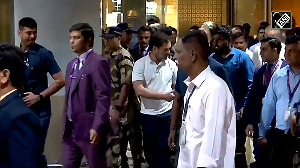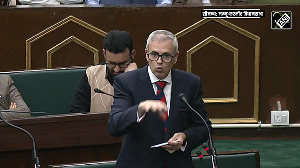The managing director of the Tata group company, Videsh Sanchar Nigam Ltd, is fast getting used to operating in the private sector.
Says S K Gupta, 60, who has been a bureaucrat all his life, "All this while I was fooling myself. What I thought was customer friendliness earlier wasn't so. Now we treat a customer as a genuine one."
VSNL is in a hurry to build-up its new customer focus. It has been a priority ever since the Tata group acquired the Rs 4,800-crore (Rs 48 billion) government telecom behemoth one-and-a-half years ago. But the market continues to be brutal to VSNL.
The general view is that VSNL is "a dying company and has no place to hide". Some claim that it is unperturbed even as its earlier monopoly international long distance business, is threatened with the entry of private players.
The fact is that it has already lost 40 per cent of the ILD market to companies like Bharti and Data Access. If BSNL itself gets into ILD that would be another severe blow.
International long distance accounted for 82 per cent of its total Rs 3,721 crore (Rs 37.21 billion) traffic revenue last fiscal. But profits have fallen by more than 50 per cent.
"In the last one year, it hasn't really made overtures to customers which is extremely critical," says an analyst tracking the sector.
The company which began with a disadvantage of being privatised and its ILD monopoly ending at the same time, desperately wants to prove its critics wrong.
Even as it is talking of upgrading technology and disposing of surplus assets, it is slowly and steadily, pursuing a host of new businesses and going full steam ahead with its national long distance plans, corporate data business, rehauling its net infrastructure.
It aims to resurface as a changed organisation next year. And armed with an aggressive marketing strategy, it wants to win end consumers with a suite of products ranging from Internet and basic telephony to voice and data transfers.
VSNL says it is on the verge of signing fresh interconnect agreements with state-owned domestic carriers Bharat Sanchar Nigam Ltd and Mahanagar Telephone Nigam Ltd -- though discussions have been underway for quite some time -- for which it carried ILD traffic.
With both BSNL and MTNL entering the ILD market, VSNL is said to be negotiating to lease its surplus capacity. It had a monopoly on ILD till the private players were allowed in last year.
"From the perspective of ILD, we will only improve from this bottom point," says Gupta, sitting in his plush sea-facing Mumbai office.
In a monopoly situation, for an US call, VSNL charged Rs 41 per minute while the rest of the world was charging a fraction of that.
There was no one to stop it from levying any amount of settlement rates to other carriers. Like BSNL at one time paid VSNL Rs 21 to carry its ILD calls.
Today, at least in its ILD business, the overseas carriers have a host of other options at a much lower cost. These include the two-year old Data Access and Bharti which have settled for as little as Rs 6 per minute.
So now, the accent is on retention, adds the manager. "We will go ahead and build relationships with multiple clients in multiple geographies with a suite of products," he says.
That's why, two months ago, it set up a wholly owned subsidiary VSNL Lanka Ltd.
This company, which has entered into an agreement with the Board of Investment, Sri Lanka, will install a state-of-the-art switch in the island for ILD services. With a toehold there, there are plans to roll out its other value added services.
Around the same time, it acquired the assets and network of Genplex, an international Internet protocol virtual private network (IP-VPN) service provider in the US, Europe and the Far East.
"We can now offer end-to-end voice and data services on our own network. The thrust is on corporate business as it gives you scope to go up the value chain which yields higher margins," says a senior manager.
Or look at its NLD plans where it claims it has laid 3,500 km of fibre optic cable as part of the 15,000 km network.
Gupta claims there is a positive rub off with NLD.
Knowing fully well that all the other players, including Reliance and Bharti are moving fast, Gupta says that the quality of service is going to be the crux here.
He adds: "We will have unique advantages with the ILD-NLD combine. It is helpful from the point of interconnect for both voice and data."
In fact, with VSNL eyeing anything that spells business, in April it unfurled a new marketing exercise by launching the Tata Indicom Enterprise Business Unit as a single interface with customers.
A centralised unit for synergistic sales and marketing, it has launched the Tata Indicom brand, offering the products of all the Tata group's telecom companies. These include VSNL, Tata Teleservices, Tata Teleservices (Maharashtra) and Tata Internet Services.
"Tata Indicom will be a single point of contact," says a VSNL manager who claims it was a client-driven move. With so many products, a sales person from each of the companies would approach corporate clients. "Now we have a bouquet of products to offer them," he adds.
This makes it easier for the company to approach retail customers, say VSNL insiders.
Now, ILD and NLD are wholesale businesses, but with the long awaited customer access code in the offing, it will take on retail overtones. It is already pushing its Internet service provider packs through its over 3,000 kiosks it has set up across the country.
Adds another senior VSNL manager, "Our thrust area is to maximise traffic and realisation even as we try get close to the end customer."
But where are the customers, is the question that everybody is asking? How is VSNL going to get the last mile connectivity, something that was earlier asked of Reliance Infocomm? That's why, it invested in Tata Teleservices, its fixed line and WLL service provider.
Clearly, even as it forays into new businesses, there are internal issues to be sorted out. VSNL has been saddled with over 40 earth stations as part of its ILD infrastructure, and most of them are outdated.
Gupta says, that there are plans to retain about eight and sell the others as part of the technology upgradation process.
Then, like most government outfits, VSNL too was people heavy. A voluntary retirement scheme saw headcount pared by 950 to touch 1,800. Gupta says that VSNL can still needs to be lean.
But more must be done. Tata chief Ratan Tata has met Telecom Minister Arun Shourie a number of times for a compensation package. And the fact is that VSNL needs new streams of revenue to compensate for the massive amounts it is losing.
Nevertheless, the industry is still sceptial about VSNL's future. The company's stock price on Friday was at Rs 122.15.
As an analyst put in, "Their moves are going to take a long time to yield results. Tata Industries' chairman Kishore Chaukar's promise of making VSNL a fully integrated telecom player in Delhi and south of the Vindhyas is not going to happen in the near future."






 © 2025
© 2025